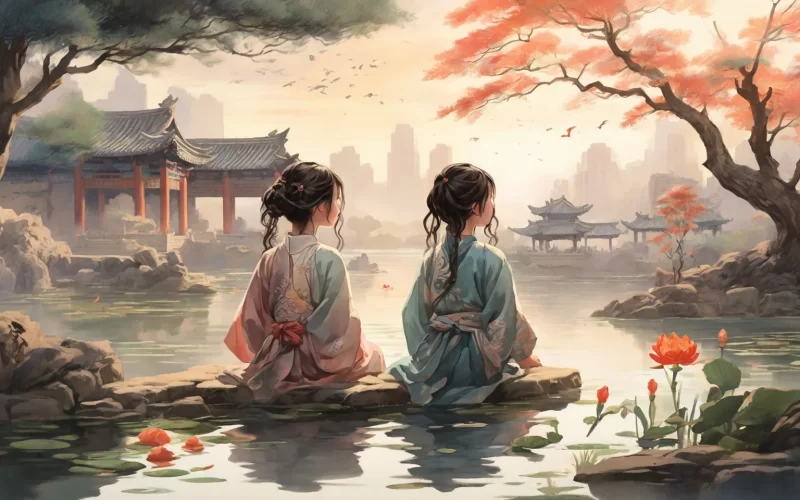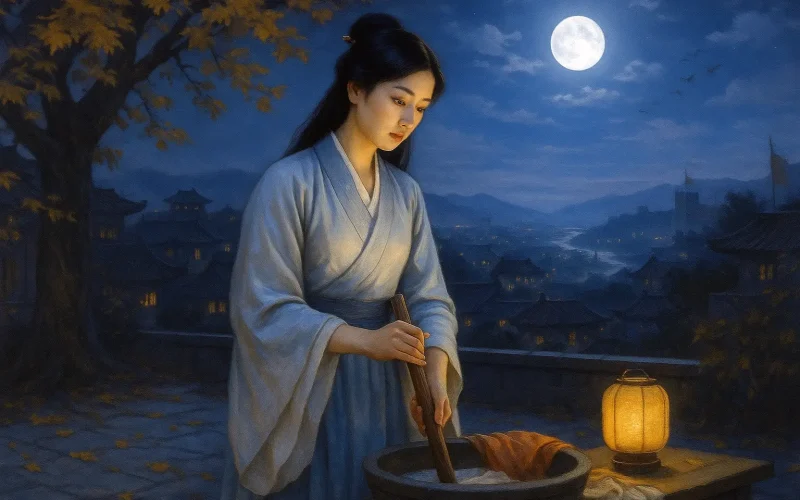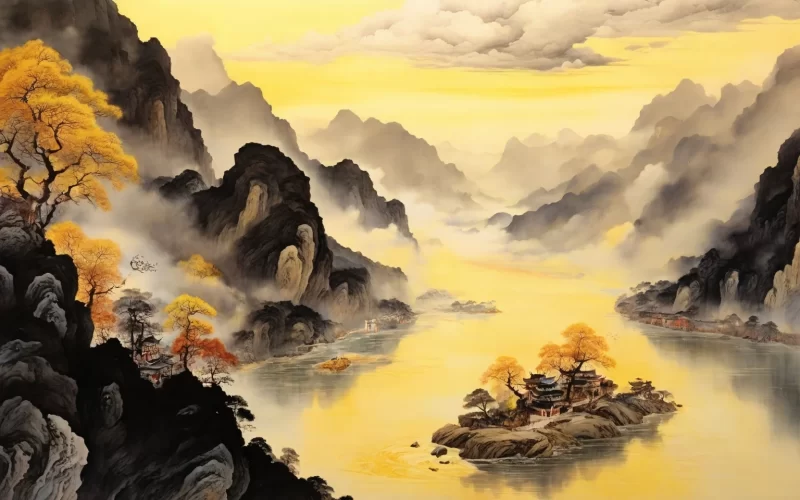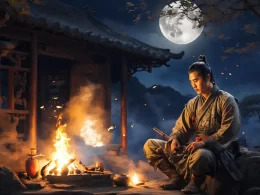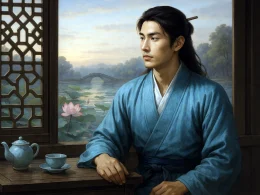My hair had hardly covered my forehead.
I was picking Bowers, playing by my door,
When you, my lover, on a bamboo horse,
Came trotting in circles and throwing green plums.
We lived near together on a lane in Ch'ang-kan,
Both of us young and happy-hearted.
...At fourteen I became your wife,
So bashful that I dared not smile,
And I lowered my head toward a dark corner
And would not turn to your thousand calls;
But at fifteen I straightened my brows and laughed,
Learning that no dust could ever seal our love,
That even unto death I would await you by my post
And would never lose heart in the tower of silent watching.
...Then when I was sixteen, you left on a long journey
Through the Gorges of Ch'ii-t'ang, of rock and whirling water.
And then came the Fifth-month, more than I could bear,
And I tried to hear the monkeys in your lofty far-off sky.
Your footprints by our door, where I had watched you go,
Were hidden, every one of them, under green moss,
Hidden under moss too deep to sweep away.
And the first autumn wind added fallen leaves.
And now, in the Eighth-month, yellowing butterflies
Hover, two by two, in our west-garden grasses...
And, because of all this, my heart is breaking
And I fear for my bright cheeks, lest they fade.
...Oh, at last, when you return through the three Pa districts,
Send me a message home ahead!
And I will come and meet you and will never mind the distance,
All the way to Chang-feng Sha.
Original Poem
「长干行」
李白
妾发初覆额,折花门前剧。
郎骑竹马来,绕床弄青梅。
同居长干里,两小无嫌猜。
十四为君妇,羞颜未尝开。
低头向暗壁,千唤不一回。
十五始展眉,愿同尘与灰。
常存抱柱信,岂上望夫台。
十六君远行,瞿塘滟滪堆。
五月不可触,猿声天上哀。
门前旧行迹,一一生绿苔。
苔深不可扫,落叶秋风早。
八月蝴蝶黄,双飞西园草。
感此伤妾心,坐愁红颜老。
早晚下三巴,预将书报家。
相迎不道远,直至长风沙。
Interpretation
This poem, written in the yuefu (folk song) style from the perspective of a merchant's wife, is set in Changgan Lane (modern Nanjing's Qinhuai River area), a bustling commercial district during the Tang Dynasty. Merchants often traveled for years, leaving their wives in lonely solitude. Through delicate brushstrokes, Li Bai creates a sincere and loyal merchant's wife形象, tracing her psychological journey from a naive girl to a lovesick woman.
Part 1: "妾发初覆额,折花门前剧。郎骑竹马来,绕床弄青梅。同居长干里,两小无嫌猜。"
Qiè fà chū fù é, zhé huā mén qián jù. Láng qí zhúmǎ lái, rào chuáng nòng qīngméi. Tóngjū Chánggān Lǐ, liǎng xiǎo wú xián cāi.
When my hair first covered my forehead, I picked flowers by the gate, playing games; You rode a bamboo horse, tossing green plums around the well, in childish claims. We both lived in Changgan Lane, two children pure and true, Without a hint of doubt or suspicion, our friendship grew.
The opening establishes the classic "childhood sweethearts" (青梅竹馬) motif. Images of "picking flowers," "riding bamboo horses," and "tossing plums" paint vibrant scenes of childhood innocence, setting the poem's tone of natural, genuine emotion.
Part 2: "十四为君妇,羞颜未尝开。低头向暗壁,千唤不一回。"
Shísì wéi jūn fù, xiū yán wèi cháng kāi. Dītóu xiàng àn bì, qiān huàn bù yī huí.
At fourteen, I became your bride, my shy face not yet unsealed; Head bowed toward the shadowed wall, even to a thousand calls, I never revealed.
This captures the bride's shyness with exquisite delicacy. "Head bowed toward the shadowed wall, never turning to calls" uses vivid imagery to show the young wife's bashfulness and nervousness.
Part 3: "十五始展眉,愿同尘与灰。常存抱柱信,岂上望夫台。"
Shíwǔ shǐ zhǎn méi, yuàn tóng chén yǔ huī. Cháng cún bàozhù xìn, qǐ shàng wàngfū tái.
At fifteen, I finally smiled bright, vowing to be like dust and ash, united evermore; Holding the "pillar-holding" faith, why would I dread the "husband-watching" tower?
Emotion shifts from shyness to passion. The vow "like dust and ash" and the allusion to the lover who drowned holding a pillar ("pillar-holding faith") show unwavering loyalty, foreshadowing the coming separation.
Part 4: "十六君远行,瞿塘滟滪堆。五月不可触,猿声天上哀。"
Shíliù jūn yuǎnxíng, Qútáng Yànyù duī. Wǔyuè bùkě chù, yuán shēng tiānshàng āi.
At sixteen, you traveled far, past Qutang Gorge's Yanyu Rock, perilous and steep; In May, the reefs lie hidden, monkeys' cries from heavens weep.
The poem turns to separation's sorrow. The dangers of "Qutang Gorge" and the mournful "monkeys' cries" reflect both the husband's perilous journey and the wife's anxiety.
Part 5: "门前旧行迹,一一生绿苔。苔深不可扫,落叶秋风早。八月蝴蝶黄,双飞西园草。感此伤妾心,坐愁红颜老。"
Mén qián jiù xíngjī, yīyī shēng lǜtái. Tái shēn bùkě sǎo, luòyè qiūfēng zǎo. Bāyuè húdié huáng, shuāng fēi xī yuán cǎo. Gǎn cǐ shāng qiè xīn, zuò chóu hóngyán lǎo.
Footprints you left by our gate now hide under moss, layer by layer; The moss grows too thick to sweep, autumn leaves fall earlier this year. In August, yellow butterflies in pairs over the west garden fly; This sight breaks my heart, sitting worried my beauty will die.
This is the poem's most moving section. "Moss too thick to sweep" symbolizes accumulated longing and time's ruthlessness; "butterflies in pairs" contrasts with the wife's solitude, merging nature with emotion to intensify the longing.
Part 6: "早晚下三巴,预将书报家。相迎不道远,直至长风沙。"
Zǎowǎn xià Sānbā, yù jiāng shū bào jiā. Xiāngyíng bù dào yuǎn, zhí zhì Chángfēngshā.
Whenever you return from Three Gorges, send a letter home first, I pray; I'll meet you, no matter the distance, even to Changfengsha, far away.
The ending concludes with a resolute vow. The promise to meet "even to Changfengsha" (700 li away) fully expresses the wife's profound love and steadfastness, leaving endless resonance.
Holistic Appreciation
Using age progression (14, 15, 16) as a timeline, the poem structures the heroine's life journey naturally. With exquisite delicacy, Li Bai traces a woman's growth from innocent girl to shy bride to loyal wife. Emotions progress layer by layer: childhood innocence, marital sweetness, separation's pain, culminating in steadfast waiting, creating an iconic female figure in Chinese literature.
Artistic Merits
- Perfect Narrative-Lyricism Blend: The poem combines storyline development with lyrical depth, containing profound emotion within plain narration.
- Masterful Detail Use: From "picking flowers" to "unsweepable moss," each detail serves emotional expression, enriching the character's realism.
- Folk Song Style Evolution: The language is fresh and natural, rhythm fluid and bright, maintaining folk song simplicity while achieving literary refinement.
Insights
This 8th-century poem's emotional core transcends time, resonating with modern readers. It shows genuine feeling can withstand time and distance. In an era of difficult travel and communication, a promise meant lifelong commitment. The wife's loyalty, marital devotion, and solitude endurance inspire reflection. Especially in today's easily distracted world, her "even to Changfengsha" determination reminds us to cherish commitment and responsibility in relationships.
Poem translator
Kiang Kanghu
About the poet

Li Bai (李白), 701 - 762 A.D., whose ancestral home was in Gansu, was preceded by Li Guang, a general of the Han Dynasty. Tang poetry is one of the brightest constellations in the history of Chinese literature, and one of the brightest stars is Li Bai.






